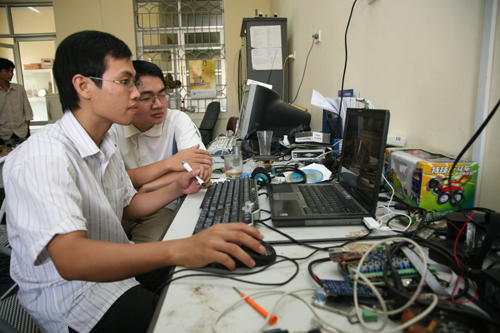
University autonomy is understood as the right of schools to determine their affairs without the intervention from watchdog agencies or the State.
This includes "self-regulatory rights", "scientific autonomy" and "self-financing", meaning that the schools set tuition, enrolment, training, personnel and financial policies.
Pedagogical experts, educators and watchdog agencies all believe that university autonomy is inevitable in Vietnam, because this is the only way to help schools upgrade their training quality, become independent and help encourage scientific research and technology transfer.
The university autonomy principle was mentioned by Prime Minister Nguyen Tan Dung, at a meeting with the Ministry of Education and Training and other ministries and branches in August 2014.

In October, the government released Resolution No 77 on the reform of state-owned training establishments’ management on a trial basis in 2014-2017.
Some schools were given self-determination rights in 2008. However, it was applied to only a few issues, and schools still could not determine tuition, though tuition is the main source of income for the schools.
Nguyen Minh Thuyet, former deputy chair of the National Assembly Committee for Culture, Education, Youth and Children, in an interview given to the local press, noted that universities have recently gained more authority in designing their training programs. However, these are not enough.
Under current regulations, the schools’ income depends on two factors – the number of students and tuition.
The number of students is determined by MOET, while the tuition is set in accordance with Decree No 49.
“The half autonomy discouraged schools because they could not find financial sources needed to cover their training and scientific research works,” an analyst said.
Dr. Hoang Van Chau, president of the Hanoi Foreign Trade University, hopes that the school can set up tuition levels for different training majors in the time to come.
He said if this happens, the school would have better financial capability to upgrade facilities and training quality.
The president of another university in Hanoi agrees with Chau, saying that with the deep intervention of the state, schools cannot do what they want.
“Inviting visiting foreign lecturers? Carrying out scientific research? Organizing classes with a reasonable number of students? Offering higher pay for lecturers to retain talent? You will only be able to do all of these things if you have money,” he said.
However, some analysts noted that while top schools are enthusiastic about autonomy, less prestigious schools are more indifferent.
“It is easy for top schools to set high tuition, but impossible for less prestigious schools,” an analyst said.






- Hanoi launches pilot project to integrate electronic health records into VNeID app
- Empowering new generation of biodiversity champions in Vietnam
- Capital Law to make Hanoi major center for quality education
- Hanoi raises road safety awareness among students
- Hanoi pilots artificial intelligence in five schools
- Modern pediatric hospital opens in Hanoi
